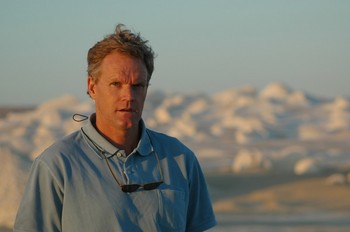Neil MacFarquhar’s tales of ordinary Middle Eastern life
"When you work for the New York Times, people expect you to know everything," according to Neil MacFarquhar.
The journalist remembered: "Like the time I was at a dinner party in San Francisco and a woman came up to me and asked ‘Are there any normal people in the Middle East? People like you and me?’"
Cue a sharp, collective intake of breath from Wednesday’s Frontline audience.
"Of course there are," MacFarquhar responsed, and then began to describe them.
If you missed this event you can watch the whole thing here:
MacFarquhar has lived in the Middle East for much of his life. He went primary school in Libya and spent time as The New York Times‘s Middle East correspondent based in Cairo.
He likes telling stories about these times. So much, in fact, that he’s written a book about them, entitled The Media Relations Department of Hizbollah Wishes You a Happy Birthday
What I like about the Middle East is talking about people’s normal lives there, and one of the most fun experiences I’ve had doing that is talking about dogs in Iran. There was a cleric that was railing against dogs saying they were un-Islamic…"
Listen to the rest of that one in this Audioboo:
Another story? How about the time when an enterprising Iranian press officer in Iran attempted to extort MacFarquhar for visas, translations, and access to government officials? At the end of the ordeal, MacFarquhar says his photographer turned to him and said, "You could have at least tried to be a little diplomatic."
Or maybe the time when MacFarquhar was pulled into the Egyptian secret police’s office for the third time in one day. This time, it was for a meeting with its chief.
Noticing the plethora of certificates from the CIA, certifying the chief in a variety of espionage skills, MacFarquhar asked, "Is this an interrogation?"
"No," the chief responded. "It’s tea."
MacFarquhar says that it’s these everyday life stories that aren’t told nearly enough in the mainstream media. In fact, he believes this so strongly that he spent his final year in Cairo writing about people effecting positive social change throughout the Middle East.
There’s one yarn, however, that MacFarquhar is less keen on spinning.
I only lost one argument with editors: it was on the Palestinian/Israeli conflct. Often you have no choice but to cover it. I didn’t want to. Even though you get on the front page a bit more, it’s just over-covered.
But no matter the story, whether it’s in Tehran, Jerusalem, or Cairo, MacFarquhar says it can all be boiled down to one "normal" sentiment:
"People just want better lives; better lives for their children, better education for their children," he says
And that, it seems, is the beginning and end of most "normal’" stories.

